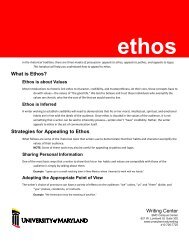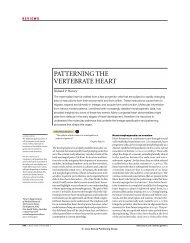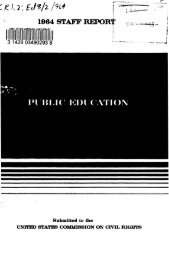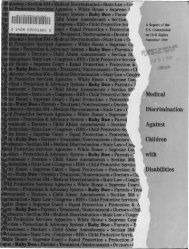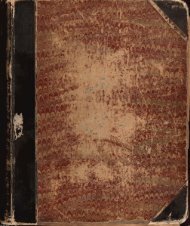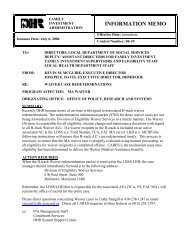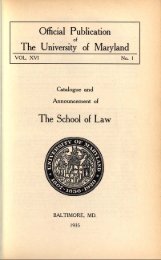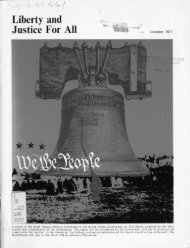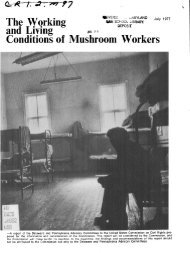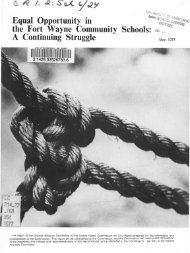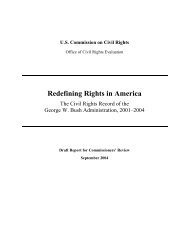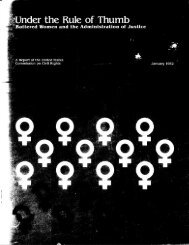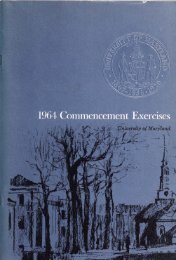1961 US Commission on Civil Rights Report Book 2 - University of ...
1961 US Commission on Civil Rights Report Book 2 - University of ...
1961 US Commission on Civil Rights Report Book 2 - University of ...
You also want an ePaper? Increase the reach of your titles
YUMPU automatically turns print PDFs into web optimized ePapers that Google loves.
measures is to frustrate orders <strong>of</strong> a court <strong>of</strong> the United States and<br />
the primary reas<strong>on</strong> for enjoining those acts is to vindicate the<br />
authority <strong>of</strong> that court, this seems altogether appropriate. Nevertheless,<br />
defendants strenuously object claiming that the Government<br />
has no interest in this private litigati<strong>on</strong> and should not be permitted<br />
to stand in for the original plaintiffs.<br />
In view <strong>of</strong> the compelling precedent in the parallel case <strong>of</strong><br />
Faubus v. United States, 8th Cir., 254 F. ad 797, we might reject<br />
the objecti<strong>on</strong> summarily, especially since it is, at best, a delaying<br />
tactic. But we deem it important to state unequivocally the right<br />
<strong>of</strong> the United States to appear in these proceedings because it involves<br />
a principle vital to the effective administrati<strong>on</strong> <strong>of</strong> justice.<br />
The United States intervened l<strong>on</strong>g after this court had finally<br />
declared plaintiffs' right to attend desegregated public schools, and<br />
after the time set for the practical implementati<strong>on</strong> <strong>of</strong> that c<strong>on</strong>stituti<strong>on</strong>al<br />
right. The merits had been adjudicated and the <strong>on</strong>ly<br />
matter remaining was the enforcement <strong>of</strong> the court's injuncti<strong>on</strong>.<br />
It was <strong>on</strong>ly when the Governor, the Legislature, and other <strong>of</strong>ficials<br />
<strong>of</strong> the State <strong>of</strong> Louisiana attempted to interpose the power and<br />
prestige <strong>of</strong> the State in a massive effort to frustrate the court's<br />
decrees that we called up<strong>on</strong> the United States as a friend <strong>of</strong> the<br />
court. It should also be stressed that the Government appeared at<br />
the court's request. The Justice Department was not intervening<br />
to protect a special interest <strong>of</strong> its own. Nor was it to champi<strong>on</strong> the<br />
rights <strong>of</strong> the plaintiffs or to defend the harassed School Board. It<br />
came in, by invitati<strong>on</strong>, to aid the court in the effectuati<strong>on</strong> <strong>of</strong> its<br />
judgment, "to maintain and preserve the due administrati<strong>on</strong> <strong>of</strong><br />
justice and the integrity <strong>of</strong> the judicial processes <strong>of</strong> the United<br />
States."<br />
One ground <strong>of</strong> defendants' unsuccessful c<strong>on</strong>tenti<strong>on</strong> that the United<br />
States had no right to intervene was the failure <strong>of</strong> C<strong>on</strong>gress in the <strong>Civil</strong><br />
<strong>Rights</strong> Acts <strong>of</strong> 1957 and 1960 to authorize the Attorney General to initiate<br />
desegregati<strong>on</strong> proceedings. In rejecting this argument, the court<br />
pointed out not <strong>on</strong>ly that the United States had not initiated the original<br />
acti<strong>on</strong>, but that it had not advised the court <strong>on</strong> the merits <strong>of</strong> its desegregati<strong>on</strong><br />
decisi<strong>on</strong>. It noted also that the Senate debates <strong>on</strong> the <strong>Civil</strong><br />
<strong>Rights</strong> Act <strong>of</strong> 1957 showed that opp<strong>on</strong>ents <strong>of</strong> such power had recognized<br />
that the United States could intervene to preserve the integrity <strong>of</strong> its<br />
courts in litigati<strong>on</strong> brought by others. 42 The court further emphasized<br />
that the Attorney General had exercised this power <strong>of</strong> interventi<strong>on</strong> in<br />
the Faubus case in 1958 and C<strong>on</strong>gress had not withdrawn it in the<br />
<strong>Civil</strong> <strong>Rights</strong> Act <strong>of</strong> 1960. The court added: "Apparently . . . [C<strong>on</strong>gress]<br />
preferred this method <strong>of</strong> enforcing court orders to the use <strong>of</strong><br />
troops." "<br />
158



